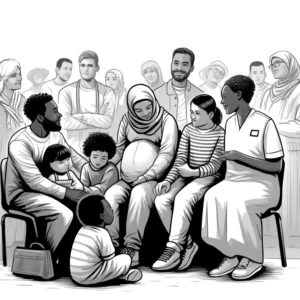Support Available to Asylum Seekers: Housing and Services
The UK government has a legal duty to consider your welfare while processing your asylum application. This includes special attention to children’s welfare and adhering to equality laws. Moreover, your treatment under this support system aligns with international human rights standards, ensuring you’re protected from inhumane treatment.
The backbone of asylum support in the UK is the Immigration and Asylum Act 1999, coupled with various regulations and directives. Notably, the EU Reception Conditions Directive played a significant role in setting the minimum living standards for asylum seekers. Despite the UK leaving the EU, these standards still apply.
Immediate Support for Asylum Seekers

Firstly, if you’re an asylum seeker at risk of destitution, or likely to face it within the next two weeks, you’re eligible for what’s known as ‘section 95 support’. This includes assistance with basic needs like accommodation, food, and clothing.
Defining Destitution
Being destitute means lacking secure housing or the means to obtain it, or having housing but being unable to meet other basic living needs.
Temporary Assistance During Application Process
For those who’ve applied for section 95 support but are awaiting a decision, there’s ‘section 98 support’. This temporary support ensures your basic needs are met until a decision on your section 95 application is made.
The law clearly states that the government must provide assistance if you apply and qualify for support. Section 95 support lasts until authorities make a final decision on your asylum claim or appeal. Additionally, you continue to qualify for section 95 support while your claim’s admissibility is under review until they reach a decision.
Accommodation
The system prioritises vulnerable people such as minors, disabled persons, pregnant women, lone parents, and violence survivors. Their special needs are crucial in deciding support types.
How Accommodation Works
Asylum seekers without a home get placed in housing across the UK without choosing the location. This arrangement lasts until they receive a final decision on their asylum claim.
The Dispersal Policy
Introduced with the 1999 Act, the dispersal policy ensures asylum seekers are housed on a no-choice basis. This aims to spread asylum support more evenly across the country, moving away from concentration in London and the southeast. Since 2010, the Home Office has contracted private companies regionally to find this housing.
Dispersal aims to use available, more affordable housing outside London and the southeast. Before this, local authorities in these areas shouldered most of the accommodation responsibilities for asylum seekers.
Who Provides the Housing?
Three companies hold contracts to offer housing and support across seven regions:
- Serco Group Plc covers the Midlands, East of England, and North West.
- Mears Group Plc manages the North East, Yorkshire, Humberside, Northern Ireland, and Scotland.
- Clearsprings Ready Homes is responsible for the South of England and Wales.
These contracts, which started in September 2019, are worth around £4 billion and are set to run for 10 years, with an option to review after seven years. These companies work with a network of housing and subcontractors to provide accommodation.
Asylum Accommodation Standards and Types
Traditionally, asylum seekers live within local communities. Their housing shifts from initial, hostel-style setups to longer-term, private residences as their application progresses.
Initial vs. Dispersal Accommodation
- Initial Accommodation: Short-term, hostel-like housing for those on initial support or awaiting long-term housing.
- Dispersal Accommodation: Long-term housing, typically self-contained homes, provided until a final asylum decision is reached.
Stays in initial accommodation are meant to be brief but can extend due to housing shortages.
Contingency and Large-Scale Accommodations
With housing pressures, the use of hotels and large-scale facilities like former military barracks has increased. These are temporary solutions to avoid breaching responsibilities to asylum seekers. The aim is to phase out hotel use and explore other large-scale housing options.
The government plans to reduce hotel use by enhancing other accommodation options. Recent efforts include identifying hotels for closure and utilising large-scale facilities like moored vessels and former military sites for housing asylum seekers.
How Accommodation Is Allocated
- No Choice Basis: Asylum seekers can’t choose their accommodation location but the Home Secretary considers individual circumstances.
- Supply and Demand: Accommodation is typically in areas with available housing, without considering personal location preferences.
- Exceptions: There are high criteria for requests, like staying in a specific area due to educational reasons for children, but these are rarely granted.
Room Sharing and Special Facilities
- Room Sharing: Unrelated single adults of the same sex may share rooms.
- Special Facilities: Large-scale facilities, like Napier Barracks or the Bibby Stockholm vessel, house single adult men, usually requiring room sharing.
Criteria for Suitability
The Home Office guides on who may not be suited for room sharing or large-scale sites. Since February 2024, this includes modern slavery victims and those involved with the foreign national offenders returns command. Vulnerable individuals or those with complex health needs may also be considered unsuitable, based on case evaluations.
Local Authority Role in Asylum Accommodation
Before 2022, local authorities had the choice to host asylum seekers in designated ‘dispersal areas’. They worked with the Home Office’s contracted providers to find suitable accommodation, aiming to avoid overcrowding by limiting asylum seekers to one per 200 residents, though exceptions were sometimes made.
By April 2022, only 47% of local authorities opted into the dispersal system. This led to criticisms about the uneven distribution of asylum seekers across the UK. Plans to reform and achieve a more balanced distribution by 2029 were delayed due to the Covid-19 pandemic, during which the Home Office expanded asylum housing nationwide, including non-dispersal areas.
Introducing the Full Dispersal Model

In April 2022, the Home Office announced a shift to a ‘full dispersal’ model, aiming to end the use of hotels for asylum accommodation. This new approach made all local authorities responsible for asylum seekers, with regional allocations based on population size. Implementation plans rolled out in March 2023, focusing on equitable asylum seeker distribution by region by 2029. Authorities renegotiated contracts to increase bedspace in key areas.
Recently, the Home Office has increased the funds it awards to local authorities for hosting asylum seekers. For the 2023/24 period, local authorities receive £3,500 for each new and used dispersal bed space, maintaining the rate from the previous year.
There’s a pilot scheme offering a one-time bonus of £2,000 to £3,000 for local authorities that quickly make new dispersal beds available. This extra funding supports local services affected by asylum accommodation and aids in providing comprehensive support for asylum seekers.
Extra Services and Benefits
Alongside housing and money, additional services are available:
- Healthcare: Free NHS access, including for prescriptions, dental care, eye tests, and glasses.
- Children’s Education: Free childcare and the same schooling rights as other children, including free school meals.
- Local Authority Schemes: Possible eligibility for more support like discounted travel.
Work Restrictions and Possibilities
Generally, you can’t work while awaiting your asylum decision. If there’s no decision after 12 months, and it’s not your fault, you might apply to work in certain skilled roles.
Care Needs Support
Local authorities provide social care for adult asylum seekers with Home Office support. If you have care needs, a local authority should assess them. The aim is to meet these needs within your asylum accommodation.
Late Asylum Claims
The UK may deny asylum support if you didn’t claim asylum “as soon as reasonably practicable”. Typically, claiming within three days of arrival meets this condition. However, they judge each case on its own circumstances.
However, they cannot deny support if it would breach your human rights. This means they cannot deny support if it would cause you serious suffering.
Making false claims to get asylum support is a crime. So is failing to inform the Home Office about any change in your situation. They can ask you to return any support received through false claims.
